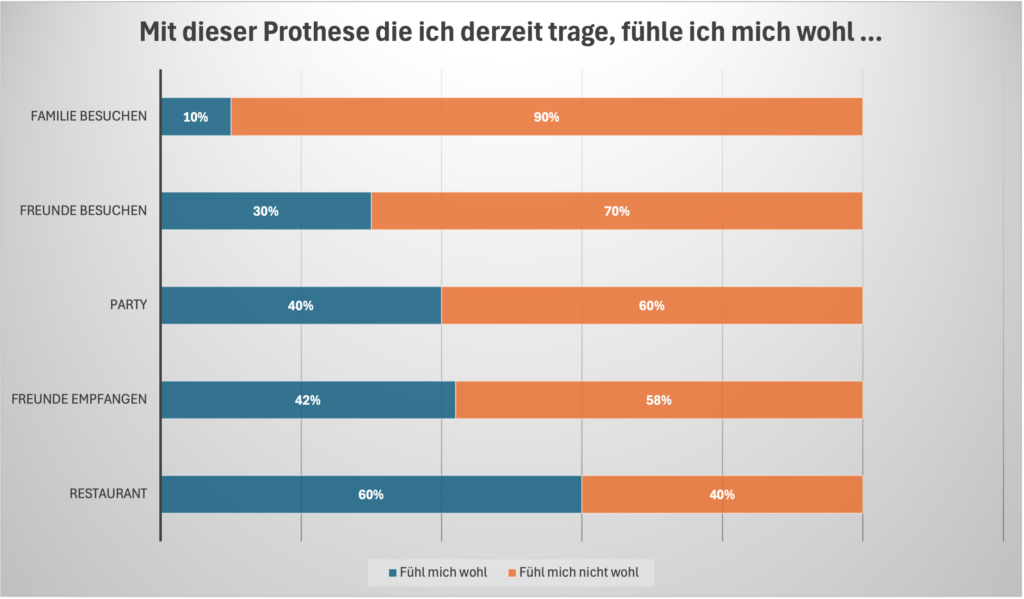Ageing depends on many factors, does not progress evenly and varies greatly from person to person. One major issue that affects many people is chewing ability in old age and the care of teeth. Many people believe that it is no longer worthwhile to have fixed dentures after a certain age, for example, but this is not the case. Good care is essential for quality of life and general physical and mental health. We explain why.
With increasing age, it becomes more difficult for people to eat healthily due to limited chewing ability [2]. 1/3 of people over the age of 65 have significant difficulty chewing. As a result, food is often selected according to chewing ability rather than nutritional content. Yet a good diet is the be-all and end-all for maintaining healthy physical functions. Especially in old age.
Various factors influence chewing performance in old age
Studies show that 10-15% of the very elderly are no longer able to chew at all. The level of prosthetic care is of course also decisive here, [1] but certain other factors such as social and economic factors also play a role. The general state of health, physical fitness, social status, how much money is available for nutrition and whether there is a partner living in the household all contribute significantly to the overall picture [2].
Chewing performance and muscle strength in old age
However, age alone does not indicate a reduction in chewing efficiency. Rather, the decrease is also related to the decline in muscle strength. This occurs due to the loss of muscle tissue in the chewing muscles. In interaction with the loss of teeth, this creates a downward spiral. This means that the more teeth you lose, the less you can chew. The less stimulation the muscles receive and therefore lose mass and strength. As a result, the maximum jaw closing force also decreases. [2].
For wearers of removable dentures, the pain threshold also plays a decisive role. In the case of dentures that are fully or partially supported by the mucosa, the maximum jaw closing force is also limited by the pain threshold of the supporting mucosa. This means that if the denture is uncomfortable and hurts when biting down, even less „work“ is done and the muscle continues to lose its mass. Even custom-fit dentures can then only partially restore chewing efficiency [2].
Dental underuse in nursing care
If you compare the elderly who are still healthy and fit at home and in social life with those in the same age group who are in nursing care, you realise that up to 60% of people in nursing care already show signs of malnutrition [1]. The Barmer Care Report from 2014 found that there is a dental underuse here. Care dependency therefore plays a key role.
However, regardless of age, it is also evident that oral health deteriorates significantly in people who become long-term carers [1].
Poor chewing performance reduces quality of life
Many patients with limited chewing ability are embarrassed to eat in public and sometimes in front of their family. They don’t want anyone to notice their poorly fitting prosthesis. This is a clear stress factor, reduces the quality of life and affects the psyche of these people [2]. Everyone has certainly experienced what it’s like to feel uncomfortable for certain reasons and would actually prefer to be safe at home in their own four walls. It is therefore understandable that people avoid public places if they feel so uncomfortable all the time.
Table 1: Social activities of 104 edentulous patients with complete dentures [graph drawn from data from Wismejer et. Al]
What can you do to maintain your chewing performance in old age?
After a proper prosthetic restoration, it is important to plan a therapy that also trains chewing and thus the muscles. This is the only way to restore good chewing ability. To check the progress of such therapy, it makes sense to use the CHEW chewing performance test. This allows you to compare how your chewing performance is developing from time to time. Would you like to make an appointment right away? You can find all dentists who offer the CHEW chewing performance test in the dentist finder.
(1) G. Kolb, A. Leischker, P. Rehmann, B. Wöstmann: Chewing function and nutritional status. Aktuel Ernahrungsmed (2016) (2) F. Müller / I. Nitschke: Oral health, dental status and nutrition in old age Journal of Gerontology and Geriatrics, Volume 38, Issue 5 (2005)



